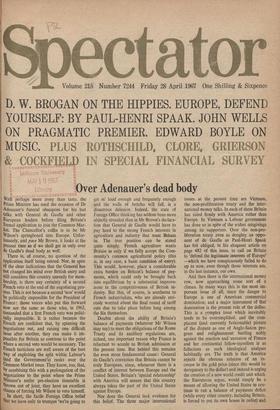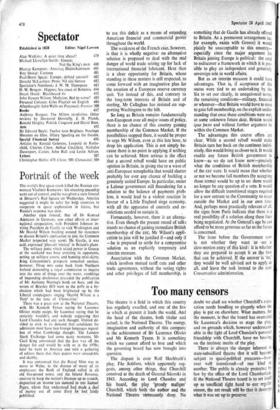• Over Adenauer's dead body
to use this deficit as a means of extending American financial and commercial power throughout the world.
The weakness of the French case, however, is that it is wholly negative: no alternative solution is proposed to deal with the real danger of world trade seizing up for lack of international financial lubricant. Here then is a clear opportunity for Britain, whose standing in these matters is still respected, to come forward with an imaginative plan tor the creation of a European reserve currency unit. Yet instead of this, and contrary to the long-term interests of Britain and of sterling, Mr Callaghan has insisted on sup- porting Washington to the hilt.
So long as Britain remains fundamentally non-European over all major issues of policy, there is no chance of this country gaining membership of the Common Market If the possibilities stopped there, it would be proper to urge Mr Wilson, even at this late hour, to drop his application. This is not simply be- cause there is no point in applying if nothing can be achieved. More serious is the effect that a second rebuff would have on public opinion in Britain, in giving rise to a wave of anti-European xenophobia that would shatter probably for ever any chance of building a genuinely united Europe. In particular, under a Labour government still floundering for a solution to the balance of payments pfob- lem, it would lead to a violent reaction- in favour of a Little England siege economy, with all the apparatus of controls and re- strictions needed to sustain it.
Fortunately, however, there is an alterna- tive. Even though the present round of talks stands no chance of gaining immediate British membership of -the EEC, Mr Wilson's appli- cation to join will be justified if—and only if —he is prepared to settle for a compromise solution as an explicitly temporary- and interim measure.
Association with the Common- Market, which involves mutual tariff cuts and other trade agreements, without the voting rights and other privileges of full membership, is something that de Gaulle has already offered to Britain. As a permanent arrangement (as, for example, exists with Greece) it would plainly be unacceptable to this country— especially since the major argument for Britain joining Europe is political: the need to rediscover a framework in which it is pos. sible to play an independent and genuinely sovereign role in world affairs. • But as an interim measure it could have advantages. That is. if acceptance of this status were tied to an undertaking by the Six to set our clearly, in unequivocal terms, the remaining conditions—military, financial or whatever—that Britain would have to meet to gain full membership, on the explicit under- standing that once those conditions were met, at some unknown future date, Britain would ipso facto and without further argument be within the Common Market.
The advantages this course offers are clear. While a second rebuff would make Britain turn her back on the continent indefi- nitely, this would bring us closer to it. It would enable any future British government to know—as We do not know now—precisely what the conditions of British membership of the EEC were. It would mean that whether or not we become full members (by accepting those terms) would be up to us: there would no longer be any question of a veto. It would allow the difficult transitional stages required for a new entrant to the Community to occur outside the Market and in our own time. And, perhaps most practically relevant of all, the signs from Paris indicate that there is a real possibility a a solution along these lino being negotiated. At the General's age he can afford to be more generous so far as the future is concerned.
The issue before -the Government now is not whether they want to see a slow-motion entry of this kind : it is whether they are prepared to Accept it as the best that can be achieved. If the answer-is 'no,' they would be well advised not to apply At all, and leave the task instead to the nest Conservative administration.







































